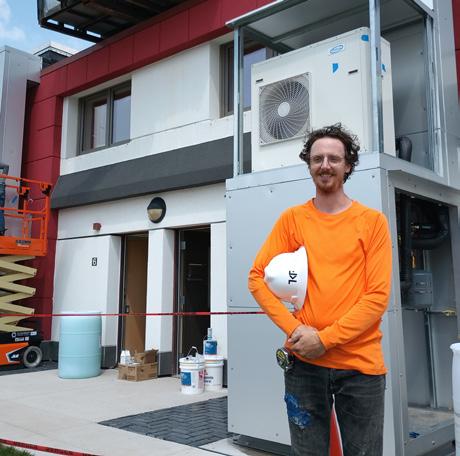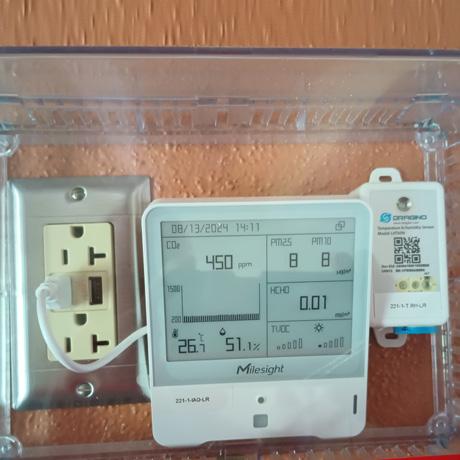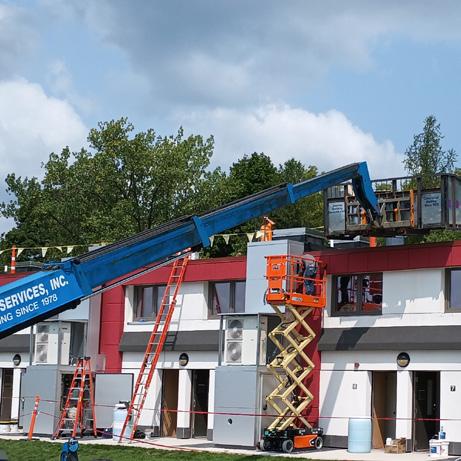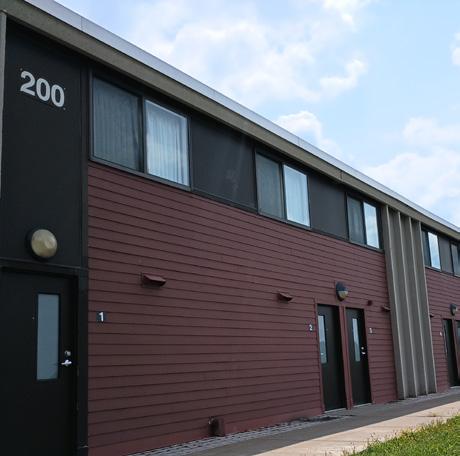Happier tenants, healthier planet. All in one.
Millions of apartments in the U.S. need substantial HVAC upgrades. Outdated systems create poor air quality, high energy use, and carbon emissions. Founded in 2019, TKFabricate makes all-in-one systems that simplify how apartment buildings are retrofitted with upgrades to HVAC and other systems—all with Net Zero greenhouse gas emissions and high performance.

For apartment building owners, integrated control and monitoring systems makes energy efficiency and long-term maintenance easier.”
— TOM KING, FOUNDER
When founder Tom King, a former architect with an engineering degree and hands-on manufacturing experience, applied his background to developing the first prefabricated system of its kind in the U.S., his vision was to make it easier to update old housing stock. His solution puts heating, cooling, hot water, ventilation, and control and monitoring systems together in one unit that features remote diagnostics and service alerts. And it’s all installed outside with no need for access to the inside of the apartments.
“For apartment building owners, integrated control and monitoring systems makes energy efficiency and long-term maintenance easier,” King says. “Our goal is to simplify those processes by delivering an industrialized component where all of these elements are condensed into a single package.”
The TKFabricate all-in-one unit also reduces the interior space required for equipment, freeing up space for residents with little-to-no disruption during installation. Plus, it makes it easier for building managers to perform regular maintenance without the need to enter residents’ living space.
Not only does the system yield substantial operational savings and increased property value, it also complements the existing façade, so changes to the exterior are minimal.

Through my graduate school program and through working in manufacturing, I had an idea—a concept—of what was needed, but it became obvious that I needed help with my manufacturing process, specifically inquality control and quality assurance.”
— TOM KING, FOUNDER
King worked closely with Syracuse-based TDO, a consulting and training organization that serves Central New York manufacturers and tech startups, and is a NIST Manufacturing Extension Partnership (MEP) center. He also found support from numerous experts through NYSERDA, Launch NY, SUNY’s College of Environmental Science and Forestry, and others. But something was still missing.
THE NEED FOR MANUFACTURING EXPERTISE
“My team and I, we all love the digital design world as well as getting our hands dirty building things,” King says. “But we lacked expertise in how to collaborate with contract manufacturers, advance our drawing set, and refine our production process while growing our capacity.”
“Through my graduate school program and through working in manufacturing, I had an idea—a concept—of what was needed, but it became obvious that we needed help with our manufacturing process, specifically inquality control and quality assurance,” King says.
While this situation is not unusual when working with prototypes, King found that he and his team were too often diagnosing problems at the installation site rather than catching them earlier in the manufacturing process.
He wanted to answer, “How do our products exit our facility with a 99% guarantee that they will operate as intended at the site?”
MAKING THE CONNECTION TO NEXTCORPS
King was initially introduced to NextCorps through an Entrepreneurs-inResidence program at NYSERDA. He then joined NextCorps’ free Manufacturing Accelerator program, which was being made available through FuzeHub— New York’s statewide Manufacturing Extension Partnership resource network —to learn what a framework should look like for manufacturing quality control. One important component of that program: Manufacturing Readiness Level (MRL) assessments. MRLs help startups take a microscopic look at every element of their production process to identify potential snags before they become real-life problems.
Through NextCorps and TDO, King was able to connect with contract manufacturers who could guide him in developing a more refined production process.“We were able to advance our manufacturing process and document everything,” King says.


BUSINESS HEATS UP
Since then, TKFabricate has rolled out beta units and is now installing the systems at its first site: student apartments at Syracuse University’s South Campus. A second installation site is now underway in Phoenix, NY.
NextCorps also connected TKFabricate to Rochester Institute of Technology, where a team is working with the company on Greenhous Gas Enterprise Resource Planning (GHG ERP) to further reduce GHGs produced by the company’s product.
The company currently leases production space in Syracuse and works with contract manufacturers, including Punch & Die Metal Fabricators, on components.
“Right now we’re sort of hybrid,” King says. “We’re in a corner of a manufacturer’s shop, building our product. The best part is, that their staff are helping us part time.”
But Tom has bigger plans for TKFabricate.
“
The additional resources in New York State for startups have been invaluable along a whole host of sub-threads. From building out pitch decks to getting a website running to manufacturing insight, partners like NextCorps are really powerful.”
— TOM KING, FOUNDER
AN EYE ON GROWTH
King sees the Northeast as TKFabricate’s target market, first and foremost. “Our products are viable in the vast majority of the US and Canada, so we can go as far as we want to as the company scales up manufacturing.”
Another puzzle piece in the works: securing more financial backing. According to King, he’s glad to be in a region where there’s help in the hunt.
“The additional resources in New York State for startups have been invaluable along a whole host of sub-threads,” he says. “From building out pitch decks to getting a website running to manufacturing insight, partners like NextCorps are really powerful.”
NEXTCORPS MANUFACTURING ACCELERATOR
NextCorps created the Manufacturing Accelerator (MA) to bridge the gaps that often exist between hardware technology inventors/entrepreneurs and contract manufacturers to help increase the rate of new product commercialization, job creation, and economic growth. Funding for this programming was provided by the National Institute of Standards and Technology (NIST) Manufacturing Extension Partnership (MEP) program.
The nationwide network of MEP centers provides a variety of services to manufacturers, from innovation strategies and process improvements to green manufacturing. Participants in the Manufacturing Accelerator get facilitated connections to contract services through these regional MEP centers. NextCorps serves as the Finger Lakes Region MEP center, as a sub-recipient of NYSTAR in New York State. For more information on MEP, visit https://www.nist.gov/mep.
The NextCorps Manufacturing Accelerator utilizes the U.S. Department of Defense Manufacturing Readiness Level metrics, along with materials derived from the U.S. Department of Energy Build4Scale curriculum and additional resources developed by NextCorps and RIT. The program is funded by Empire State Development’s Division of Science, Technology and Innovation, and is administered by NextCorps and its partners like Innovation Works.
The NextCorps Manufacturing Accelerator Initiative was funded by the New York State Department of Economic Development (DED) and the National Institute of Standards and Technology (NIST). The opinions, results, findings, and/or interpretation of data contained herein are the responsibility of NextCorps and do not necessarily represent the opinions, interpretations, or policy of the State of New York or NIST.
